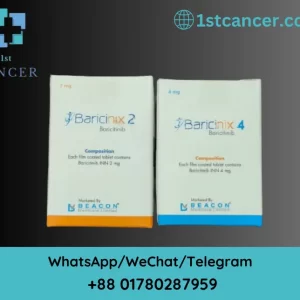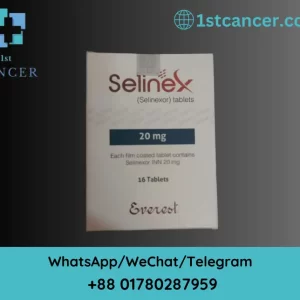Tofacitinib: A Leading JAK Inhibitor for Inflammatory Diseases
Tofacitinib, marketed primarily under the brand name Xeljanz (and as Jaquinus in Russia), is an oral Janus kinase (JAK) inhibitor developed through a collaboration between the National Institutes of Health (NIH) and Pfizer. This targeted medication is designed to treat a spectrum of inflammatory conditions, including rheumatoid arthritis, psoriatic arthritis, ankylosing spondylitis, polyarticular course juvenile idiopathic arthritis, and ulcerative colitis.
Medical Uses
- Rheumatoid Arthritis (RA): Tofacitinib citrate is approved for adults with moderately to severely active RA who have not responded adequately to methotrexate. In Europe, it is indicated both as a combination therapy with methotrexate and as monotherapy if methotrexate is not suitable.
- Ulcerative Colitis: In May 2018, the U.S. FDA approved tofacitinib as the first oral JAK inhibitor for treating adults with moderately to severely active ulcerative colitis, expanding the treatment options for chronic inflammatory bowel disease.
- Other Indications: The medication is also used to manage psoriatic arthritis, ankylosing spondylitis, and, for pediatric patients, polyarticular course juvenile idiopathic arthritis. These approvals highlight its versatility across various autoimmune and inflammatory conditions.
Adverse Effects and Safety Considerations
Tofacitinib has been associated with both common and serious side effects:
- Common Side Effects:
- Diarrhea
- Headache
- High blood pressure
- Serious Side Effects:
- Increased risk of infections (bacterial, mycobacterial, fungal, and viral)
- Potential development of cancer, including lymphoma
- Pulmonary embolism and other thromboembolic events
- Cases of upper respiratory tract infections, nasopharyngitis, and even tuberculosis in phase III trials
In response to concerns about pulmonary embolism risk—especially with the higher 10 mg twice-daily dose—the European Medicines Agency (EMA) recommended temporarily avoiding this dosage in high-risk patients. The U.S. FDA has also issued warnings regarding blood clot risks. Laboratory monitoring is advised due to potential impacts on lymphocytes, neutrophils, hemoglobin, liver enzymes, and lipid profiles.
Furthermore, tofacitinib’s dosage may need adjustments when taken concurrently with potent inhibitors of cytochrome P450 3A4 (CYP3A4) or dual inhibitors of CYP3A4 and CYP2C19 (for example, ketoconazole and fluconazole). Patients using live vaccines should avoid immunizations during treatment.
Mechanism of Action
Tofacitinib works by inhibiting key enzymes in the JAK-STAT signaling pathway—primarily JAK1 and JAK3. By blocking these enzymes, the medication disrupts the transmission of cytokine and growth factor signals into the cell nucleus, thereby reducing inflammation and immune system overactivity. Preclinical studies in mouse models of arthritis have shown that tofacitinib can rapidly suppress inflammatory mediators and STAT1-dependent genes, which underpins its therapeutic benefits even beyond selective JAK3 inhibition.
Development and Regulatory History
- Discovery and Early Development: The significance of targeting JAK3 was first discovered by immunologist John O’Shea at the NIH. Pfizer joined a public-private partnership in 1996 to advance research and development of this class of compounds, initially coding the drug as CP-690,550. The original name, tasocitinib, was later revised to tofacitinib based on international nonproprietary naming guidelines.
- Regulatory Milestones:
- November 2012: The FDA approved tofacitinib for the treatment of rheumatoid arthritis.
- February 2016: An extended-release version was introduced, expanding dosing options.
- September 2020: Approval was extended to children and adolescents (age two and older) with active polyarticular course juvenile idiopathic arthritis.
- December 2021: The FDA approved tofacitinib for adults with active ankylosing spondylitis.
With its patent expired in some regions, generic formulations became available in the U.S. as of June 2021, broadening patient access.
- Additional Insights: A 2014 study indicated that tofacitinib might convert white fat into brown fat, suggesting potential applications in obesity management—a testament to its diverse biological effects.
Societal Impact and Economic Considerations
Xeljanz (tofacitinib) has become a significant revenue generator for Pfizer, reporting US$1.703 billion in sales in 2023. However, economic reviews such as those by the Institute for Clinical and Economic Review (ICER) have noted considerable price escalations without corresponding new clinical evidence. These cost increases have led to additional financial burdens for U.S. payers, prompting ongoing discussions regarding drug pricing and healthcare affordability.
Research & Future Directions
Recent studies (as of August 2024) continue to validate tofacitinib’s effectiveness in managing moderate to severe rheumatoid arthritis and other inflammatory diseases. Active research is exploring its safety profile, potential expanded indications (including atopic dermatitis and further orthopaedic applications), and combination therapy regimens. Ongoing trials also focus on optimising dosage to balance efficacy with safety.
For healthcare professionals, patients, and policy makers, keeping up with the latest peer-reviewed clinical guidelines and head-to-head treatment comparisons proves essential for informed decision-making.
Conclusion
Tofacitinib represents a critical advancement in the treatment of autoimmune and inflammatory diseases by offering a targeted JAK inhibition approach. Its robust clinical data in rheumatoid arthritis, ulcerative colitis, and other conditions, alongside ongoing research into new applications and optimised treatment protocols, secures its role as a cornerstone therapy in modern medicine.





